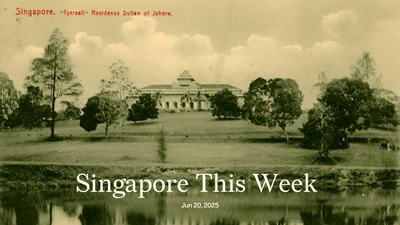Politics: Men in White in crisis
Singapore’s ruling People’s Action Party (PAP) faces a “severe crisis”, said CNA, following a string of scandals involving its senior politicians. Last week, S Iswaran, transport minister, was arrested, along with tycoon Ong Beng Seng, as part of an investigation by the Corrupt Practices Investigation Bureau. The two, subsequently released on bail, have been instrumental in getting the Formula 1 (F1) race to Singapore. This week, Tan Chuan-Jin, speaker of Parliament, resigned along with Cheng Li Hui, a PAP member of Parliament (MP), over an extramarital affair that the prime minister, Lee Hsien Loong, knew about since 2020. The party is arguably weaker now, in terms of voter confidence, than at any point since independence. “Every election from now on will be about which party forms the government,” said Lawrence Wong, the party’s chosen next leader, last year. Many at the time wondered what he was smoking. Perhaps he simply knew what was coming. Keeping the PAP’s mood up is a video, mysteriously leaked on the same day as Tan and Cheng’s resignations, about another extramarital affair involving Leon Perera and Nicole Seah, Workers’ Party (WP) politicians, which has also prompted them to resign. The PAP will also be buoyed by the seeming decision by Ng Kok Song, a former GIC chief investment officer, to contest the presidential election later this year—he’ll spoil the vote share of non-PAP candidates. Lee Hsien Loong, Singapore’s prime minister since 2004, said in 2017 that he was ready to step down in a couple of years. But he’s still around and may even lead his party to the next general election (GE), due by 2025. The so-called “4G” leadership team appears to have disappointed him in so many ways that he might be feeling anxious about handing over the reins to the party his father co-founded.
Politics: Singapore loses four MPs and one rising star in a week
First, Iswaran was forced to take a leave of absence. There’s much speculation online about possible cronyism or corruption involving Ong, as well as Bernie Ecclestone, F1 mogul, though it’ll probably be some time before we know the truth. Few will miss Iswaran, who, civil servants told Jom, irritated many in the government with his F1-related bravado and demands. Cheng and Tan were next to go. Cheng was a relatively quiet backbencher. Tan, who entered politics in 2011 and was once touted as a potential future prime minister, was one of Singapore’s most recognisable politicians. Loved by many in the party, outside he was better known for his Christianity, which infused his social media messaging, as well as his elitism. In 2015, he visited Singapore’s cardboard collectors, who earn less in a one-night shift than he did in one minute. His conclusion was that their lives weren’t that bad, and that some of them collect cardboard “as a form of exercise and activity”. By contrast, the WP’s Perera was long known for fighting for the rights of the underprivileged, and was one of Parliament’s most articulate and passionate speakers. “He is one of the few politicians to have ever left the redoubtable K Shanmugam, minister for law and home affairs, at a loss for words, during the debate on The Protection from Online Falsehoods and Manipulation Act 2019 (POFMA),” we wrote in an earlier editorial. Many might mourn the loss of Seah the most, even though she’s the only one not in Parliament. She began her political career as a candidate for the National Solidarity Party in the 2011 GE. At the 2020 GE, when the PAP realised she was contesting for the WP in East Coast, they parachuted in heavyweight Heng Swee Keat to head off her challenge. His team scraped through with 53.4 percent of the vote. Many expected Seah to lead a WP team to victory at the next GE. The loss of Perera and Seah will likely, in the short-term, be more damaging to the WP than the loss of Cheng, Iswaran and Tan is to the PAP. Pritam Singh, WP chief, has won plaudits for his decisiveness this week: “...the requirement to be frank and honest in our dealings with the Party and the people of Singapore is exacting and non-negotiable,” he wrote to Perera, in accepting his letter of resignation. Now he has to replace two of his stars and rebuild confidence in the party’s electoral prospects.
Society: Musician Subhas Nair gets rap sheet
On Tuesday, Singaporean rapper Subhas Nair was found guilty of attempting to promote ill-will among racial and religious groups. He was convicted of four charges of this nature over incidents that happened between July 2019 and March 2021, all of which he contested. Nair first came under the legal spotlight in 2019 when the police issued a 24-month conditional warning to him and Preeti Nair, his sister, for making and posting a video in response to the “brownface” controversy around a NETS advertisement. He was meant to have remained crime-free during the two years, but was charged in October 2021 for breaching the warning’s terms. The four charges include the original video reprimand and three new offences committed after the warning. The police have insisted that Nair’s allegations of differential or preferential treatment based on race or religion are baseless. And have warned that they could erode the public’s trust in law enforcement agencies. During his trial in March, Nair explained his intentions behind each incident. From wanting to end “brownface” in Singapore with the infamous 2019 video, to trying to call out “media bias and how certain people and cases were reported.” The district judge rejected Nair’s explanations, however, finding them inconsistent and even “in direct contradiction with the words used in the posts.” The “irresistible inference to be drawn”, the judge surmised, was that Nair had wittingly tried to promote feelings of ill-will among racial and religious groups. We, however, consider there to be a different perspective on what Nair intended. Our opinion is that Nair’s intention has always been to call out apparent structural racial injustices in order to improve racial harmony. (Even if his methods and words aren’t to everybody’s taste.) The potential sentence is a jail term of up to three years, a fine, or both. The conclusion to Nair’s case brings to the fore again the prickly territory that is race and religion in multicultural Singapore. While few would argue against the importance of laws that curtail and punish hate speech, how might they also be limiting discourse and preventing the average Singaporean from calling out and talking about racism? This decision will likely scare off some minorities from speaking up.
Earth: Hot new energy source near you
Have you taken a dip in Sembawang’s natural hot spring? Its heat source could be a new source of renewable energy for Singapore. Researchers have found that the geological area known as Simpang Granite Pluton (which includes the Sembawang hot springs and Admiralty Lane) has the potential to be a significant geothermal energy resource. Geothermal energy, derived from the radioactive decay of materials in the earth’s core, is conventionally harnessed from subterranean hot water and steam, though in Singapore it will require the direct tapping of hot, dry rock—by pumping fluids, through underground pipes, which transfer heat from deep below the surface. The research team, which includes contributors from Nanyang Technological University (NTU), research centre Tumcreate as well as infrastructure consultancy Surbana Jurong, drilled to a depth of 1.1km at an Admiralty site and found temperatures ranging from 60°C to 90°C. They estimated that the temperature at a 4-5km depth could reach 200°C, the point at which electricity generation is theoretically possible. This additional source of clean energy could “contribute to a more sustainable and diversified energy mix,” said Ralph Foong, Energy Market Authority (EMA) deputy chief executive of energy planning and development. This is particularly encouraging considering Singapore is heating up twice as fast as the rest of the world, partially due to our reliance on air-conditioners that eject hot air and bring up the temperature of the surrounding atmosphere. Moreover, closed-loop systems are ideal for land-scarce countries because they have a much smaller footprint, per unit of power produced, than other sorts of power plants. But this geothermal energy source will take some time to become a reality. Until then, you can soft-boil an egg at the hot spring.
History weekly by Faris Joraimi
There’s an allure to forbidden romances that can bring down kingdoms and states. One of my favourites from the annals of history is found in the famous 17th-century Malay saga, Hikayat Hang Tuah. Its protagonist is the folk hero Hang Tuah, whose greatest virtue was not his skills as a polyglot admiral, diplomat, statesman and later religious mystic (all of which he was) but unwavering loyalty to his master, the king of Melaka. Once, the king sought the hand of a maiden from Inderapura (today’s Pahang), named Tun Teja. News of her beauty spread far and wide, attracting great men of renown as suitors. She rejected all of them, including Melaka’s king, arguing that she could not possibly marry so mighty a lord, whereas she was but a lowly commoner. “Let hornbills be with hornbills, and sparrows be with sparrows,” said Tun Teja, silencing the king. And so his most trusted emissary Hang Tuah tried to cajole her. With his beguiling charm, Hang Tuah made the happily single Tun Teja fall in love with him, while his own affection for her grew. He could have easily given in and eloped, but being his raja’s faithful servant, Hang Tuah never so much as touches Tun Teja. He does not eat with her, nor holds her hand except with a fine cotton handkerchief to prevent direct contact. Finally, Tun Teja follows Hang Tuah to his ship and they sail away, the former thinking they will marry each other at last. Upon arrival in Melaka, Hang Tuah offers her up to the king. Tun Teja is heartbroken, but Tuah gives her a final gift: a magic betel quid (sirih) that makes her forget she ever loved him. Between the state on one hand and love on the other, Hang Tuah made the “right” choice. But our world is not that of the hikayat, where things seem so simple.
Arts: A new NMP, but not the one chosen by the community
A nominated member of Parliament (NMP) has been chosen for the arts community: Usha Chandradas, a lawyer by training and the co-founder of digital art magazine Plural Art Mag. Jom earlier this year wrote about the fraught NMP scheme and the arts community’s ongoing attempts to select their own representatives. The candidate from this year’s arts NMP town hall, theatre practitioner and educator Noorlinah Mohamed, was ultimately not selected. Environmentalists adopted a similar approach, convening under the SG Green Groups Town Hall name to vote on a representative. Madhumitha Ardhanari, a sustainability strategist, and Jayden Ong, co-founder of a composting start-up, each garnered over 25 percent of the votes, the minimum threshold to have their candidacies supported by SG Green Groups. Neither candidate was chosen. In fact, none of the nine NMPs to be sworn in later this month will represent “green” concerns in Parliament. Professor Koh Lian Pin, director of the Centre for Nature-based Climate Solutions at the National University of Singapore, was part of the last cohort of NMPs. NMPs are chosen by a Special Select Committee of elected MPs. Jom believes the scheme is undemocratic and ineffectual—even more so when individual communities’ own nominees aren’t selected.
Arts: Even the Grand Dame does sponsored content
The Raffles Hotel has launched a cocktail menu inspired by its history. The hotel traces its roots back to 1887 and has long boasted of its famous guests, many of them Western writers of the colonial age—Somerset Maugham, Joseph Conrad, Rudyard Kipling, and Noël Coward to name a few. In continuing with this tradition, the hotel launched a new residency programme for writers in 2019 after its facelift. Not much information is available about the residency programme; the writers hosted so far seem to be invited rather than part of an open application process. Residents are hosted for up to a month on the hotel’s premises in exchange for written work inspired by the historic venue. The first two writers-in-residence were British essayist Pico Iyer and the little known New Zealand travel writer Vicki Virtue. Virtue published her first book, a mystery titled The Raffles Affair, after the residency. These luminaries provide the conceptual backbone of the Writers Bar’s new menu. The menu’s Maugham section features bubbly cocktails, Conrad’s lists shaken drinks, and the section named for Iyer carries a curated edit of S$68 classics made with vintage spirits. The hotel’s most recent resident writer, investment manager and poet Madeleine Lee, is its first Singaporean awardee. She has also been honoured with a spot on the cocktail menu: five new drinks take inspiration from Lee’s newest poetry collection How to Build a Lux Hotel. The book is available for sale via the hotel.
Tech: The perils of being a digital bank
It appears as if GXS Bank, a digibank formed by Grab and Singtel, may be trying to raise its total deposit cap, set at S$50m by the Monetary Authority of Singapore (MAS) for new digital banks. According to Venture Cap Insights, which tracks regulatory filings, Grab invested another US$101m (S$133.4m) into GXS Bank. At the time of writing, Grab hadn’t replied to Tech in Asia’s request for comment on the reason for the cash injection. But the move is likely part of its engagement with MAS to increase the ceiling for deposit caps. Another hint? In July, the bank increased the maximum deposit amount per eligible account from S$5,000 to S$75,000, a move that wouldn’t be possible without an overall increase in its deposit cap. GXS Bank’s main competitor, Trust Bank (a partnership between Standard Chartered Bank and FairPrice Group), holds a full bank licence and hence isn’t subject to a deposit cap. As of May, Trust Bank’s deposit balance surpassed US$739.5m (S$978.3m). Grab’s infusion of capital into GXS reflects how competition is heating up between digibanks in Singapore. It also signifies how GXS is poised to navigate regulatory challenges and compete against established players in the digital banking space. It will be interesting to see how GXS Bank leverages this investment to maintain competitiveness in Singapore's evolving digital finance landscape.
Tech: Carousell goes head-to-head with Carro
Singapore’s online marketplace, Carousell, has made its foray into the vehicle subscription space. By partnering with Carzuno, it now has access to a fleet of over 50 car models. Carousell Car Subscription allows users to apply for a car subscription lasting between one and 24 months. Key features include insurance, servicing, and maintenance. It’s a move that seems to be strategically designed to cater to young Singaporeans seeking cost-effective alternatives to traditional car ownership, especially with the continuous increase in certificate of entitlement premiums and living expenses. Carousell’s new service puts it in competition with the likes of Carro, a Singapore-based automotive marketplace that launched its vehicle subscription service, Leap, in 2019. Leap provides access to both brand-new and pre-owned cars, capitalising on a similar customer demand for affordable and flexible car usage. There are also short-term (one hour to five days) car-sharing platforms such as GetGo which boasts an electric fleet. In this heated marketplace, Carousell’s move into vehicle subscriptions could boost its slowing revenue growth of 21.8 percent to US$49.5m (S$65.4m) in 2021. However, success will hinge on the affordability and flexibility of its offerings compared to established players like Carro.
If you enjoy Jom’s work, do get a paid subscription today to support independent journalism in Singapore.








